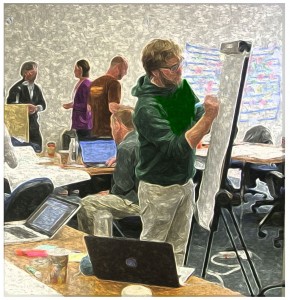Monday, July 28th, 2014...9:52 am
DPMI: A learning journey

Josh Fleming (MA IPS ’15) participates in a facilitation exercise during the second week of DPMI Monterey this June.
I had heard repeatedly on campus that DPMI (Design, Partnering, Management and Innovation) is one of the most useful courses you can take. I found this hard to believe at first, but now I agree. If you haven’t taken this leadership training in international development project management and social change then you should reconsider.
You will walk away from the DPMI training having learned some ground-breaking and ‘tried and true’ tools to solving your next problem, motivating your staff or making your next big partnership. Tools that break down these processes into quantifiable, qualifiable methods to be used at a given moment or throughout the lifespan of a project.
If you are a non-profit guru, a development practitioner in training, or a social change maker then you will notice, quickly, that these tools and capacities that DPMI finds so important are actually pretty important. This is how USAID, and other major non-profit employers do it, and whether you like it or not USAID often sets the standard. Additionally, from the United Nations to grassroots organizations, from CSR departments to State department recruiters–most are looking for project management skills. DPMI fits them nicely into the longest three weeks of your life (Yes, I’ve thrown in a bit of sarcasm). It’s worth it though. I implore you to find one job posting that doesn’t ask for project management skills.
Great minds have come together to put into action a training that is contemporary, engaging and most of all – useful. Hopefully you are the individual who wants to see development mean the promotion of a “system of catalysts” that truly allows for the NGO, the establishment, and the individual to meet human need.
DPMI supports creating catalysts that transcend national boundaries and cultural norms in order to positively influence behaviors allowing us to collectively reach our full developmental potential. Either way, after DPMI you will at least better understand what the problem is you are trying to address before trying your visionary solution.
Learn more about the DPMI training at http://go.miis.edu/dpmi. The next trainings are offered in Monterey and Rwinkwavu, Rwanda in January 2015.
About the Author: Josh Fleming is a MA in International Policy Studies student at the Monterey Institute. He took the DPMI training May 19-June 6, 2014. He served as a DPMI graduate assistant coordinator in May and currently works as a graduate assistant in the Graduate School of International Policy and Management.


